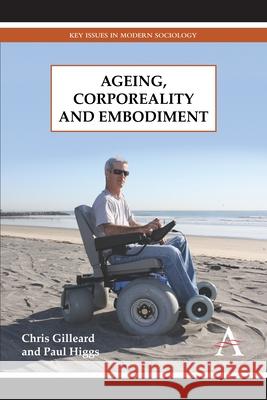Ageing, Corporeality and Embodiment » książka
Ageing, Corporeality and Embodiment
ISBN-13: 9781783083374 / Angielski / Miękka / 2014 / 228 str.
Ageing, Corporeality and Embodiment
ISBN-13: 9781783083374 / Angielski / Miękka / 2014 / 228 str.
(netto: 122,25 VAT: 5%)
Najniższa cena z 30 dni: 127,31
ok. 30 dni roboczych.
Darmowa dostawa!
'Ageing, Corporeality and Embodiment' argues that both ageing as a unitary social process and agedness as a distinct social location have become fragmented. The book concentrates on the emergence of a 'new ageing' mediated in part through the processes of 'embodiment'. The first section provides the main theoretical context for the book, with the first chapter outlining the new 'sociology of the body' and the second outlining the emergence of new ageing and its 're-orientation' toward the body. The second section explores the relationship between new ageing and key aspects of embodied identity, namely gender, race, disability and sexuality. In each of these sections, the authors provide a brief historical perspective on the emergence of these embodied identities as social movements during the cultural ferment of the 1960s, and explore their subsequent confrontation, or avoidance of confrontation with, the issue of ageing. The third section covers embodied practices, from sexual practice and its re-orientation toward age and ageing, to the embodied practices of 'appearance management', particularly those associated with cosmetics, clothing and fashion. Finally, the book considers 'new enhancement technologies' of the body, such as plastic surgery, with relation to ideas of 'rejuvenation'. By focusing upon those embodied practices that are oriented toward age and ageing, and their place in expressing, maintaining or recreating other 'pre-performed' identities, the work allows a more embodied understanding of ageing and its diverse engagements within society to be realised.
Ageing, Corporeality and Embodiment outlines and develops an argument about the emergence of a new ageing during the second half of the twentieth century and its realisation through the processes of embodiment. The authors argue that ageing as a unitary social process and agedness as a distinct social location have lost much of their purchase on the social imagination. Instead, this work asserts that later life has become as much a field for not becoming old as of old age. The volume locates the origins of this transformation in the cultural ferment of the 1960s, when new forms of embodiment concerned with identity and the care of the self arose as mass phenomena. Over time, these new forms of embodiment have been extended, changing the traditional relationship between body, age and society by making struggles over the care of the self central to the cultures of later life.











